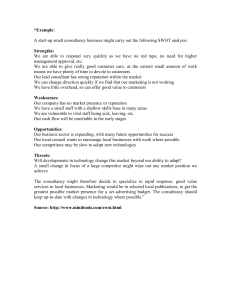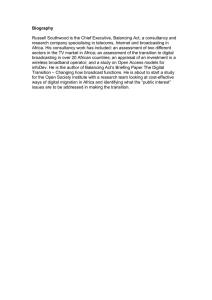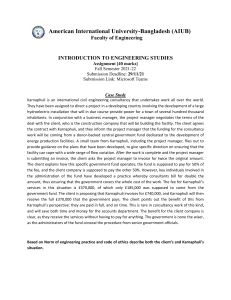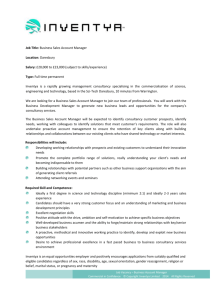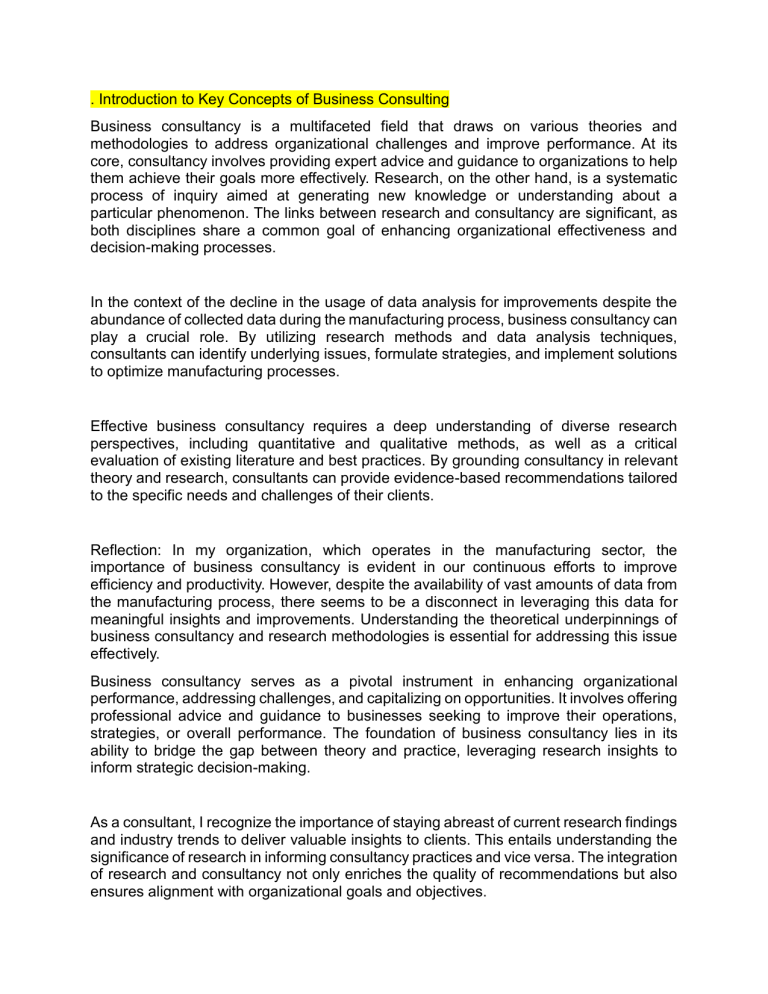
. Introduction to Key Concepts of Business Consulting Business consultancy is a multifaceted field that draws on various theories and methodologies to address organizational challenges and improve performance. At its core, consultancy involves providing expert advice and guidance to organizations to help them achieve their goals more effectively. Research, on the other hand, is a systematic process of inquiry aimed at generating new knowledge or understanding about a particular phenomenon. The links between research and consultancy are significant, as both disciplines share a common goal of enhancing organizational effectiveness and decision-making processes. In the context of the decline in the usage of data analysis for improvements despite the abundance of collected data during the manufacturing process, business consultancy can play a crucial role. By utilizing research methods and data analysis techniques, consultants can identify underlying issues, formulate strategies, and implement solutions to optimize manufacturing processes. Effective business consultancy requires a deep understanding of diverse research perspectives, including quantitative and qualitative methods, as well as a critical evaluation of existing literature and best practices. By grounding consultancy in relevant theory and research, consultants can provide evidence-based recommendations tailored to the specific needs and challenges of their clients. Reflection: In my organization, which operates in the manufacturing sector, the importance of business consultancy is evident in our continuous efforts to improve efficiency and productivity. However, despite the availability of vast amounts of data from the manufacturing process, there seems to be a disconnect in leveraging this data for meaningful insights and improvements. Understanding the theoretical underpinnings of business consultancy and research methodologies is essential for addressing this issue effectively. Business consultancy serves as a pivotal instrument in enhancing organizational performance, addressing challenges, and capitalizing on opportunities. It involves offering professional advice and guidance to businesses seeking to improve their operations, strategies, or overall performance. The foundation of business consultancy lies in its ability to bridge the gap between theory and practice, leveraging research insights to inform strategic decision-making. As a consultant, I recognize the importance of staying abreast of current research findings and industry trends to deliver valuable insights to clients. This entails understanding the significance of research in informing consultancy practices and vice versa. The integration of research and consultancy not only enriches the quality of recommendations but also ensures alignment with organizational goals and objectives. Moreover, business consultancy serves as a catalyst for organizational change and innovation. By identifying areas for improvement and implementing strategic interventions, consultants facilitate organizational growth and competitiveness. Therefore, the outcomes of consultancy projects are closely linked to achieving strategic objectives, driving performance improvements, and fostering innovation within organizations. In my practice as a consultant, I am committed to leveraging research-driven insights, aligning interventions with organizational objectives, and fostering a culture of innovation to drive sustainable growth and competitive advantage for my clients. Business consulting is a multifaceted field aimed at helping organizations enhance their performance, solve problems, and achieve their strategic objectives. It involves providing expert advice, guidance, and recommendations based on thorough analysis and understanding of organizational dynamics, industry trends, and market conditions. The foundation of business consulting lies in its ability to bridge theory and practice, drawing upon various disciplines such as management, economics, marketing, and organizational behavior. As a consultant, I understand the importance of business consultancy in driving organizational success and sustainability. By leveraging my expertise and knowledge, I aim to assist clients in identifying opportunities for growth, optimizing processes, and overcoming challenges. The link between research and consultancy is integral, as research provides the empirical evidence and theoretical frameworks necessary to inform consultancy practices effectively. Furthermore, the potential benefits of research and consultancy for organizations are manifold. From improving operational efficiency and productivity to enhancing customer satisfaction and loyalty, consultancy interventions can have a profound impact on organizational performance. By aligning with strategic organizational aims and objectives, consultants can deliver tailored solutions that address specific needs and priorities. In my practice, I strive to stay updated with the latest research findings and industry insights to deliver value-added solutions to clients. By integrating theoretical knowledge with practical experience, I aim to provide innovative and impactful consultancy services that drive sustainable growth and competitive advantage for organizations. Business consulting is a dynamic field that encompasses a wide range of activities aimed at assisting organizations in improving their performance, solving problems, and achieving strategic objectives. At its core, business consultancy involves providing expert advice, guidance, and recommendations based on thorough analysis and understanding of organizational dynamics, industry trends, and market conditions. The link between research and consultancy is integral, as research provides the empirical evidence and theoretical frameworks necessary to inform consultancy practices effectively. In my current role as a consultant, I have witnessed firsthand the importance of grounding consultancy in relevant theory and diverse research perspectives. By drawing upon a wide range of literature and research findings, consultants can develop innovative and evidence-based solutions that address the specific needs and challenges faced by organizations. For example, in a recent project aimed at improving employee engagement within a multinational corporation, we conducted a thorough literature review to understand the key drivers of engagement and identify best practices for fostering a positive work environment. Moreover, the potential benefits of research and consultancy for organizations are significant. From enhancing operational efficiency and productivity to fostering innovation and driving growth, consultancy interventions can have a profound impact on organizational performance. By aligning with strategic organizational aims and objectives, consultants can deliver tailored solutions that create sustainable value and competitive advantage for clients. In my practice, I am committed to staying updated with the latest research findings and industry insights to deliver high-quality consultancy services to clients. By integrating theoretical knowledge with practical experience, I aim to provide innovative and impactful solutions that drive positive change and help organizations achieve their goals. Business consultancy is a multifaceted practice aimed at providing expert advice and solutions to organizations facing various challenges or seeking opportunities for improvement. It involves the application of specialized knowledge, skills, and methodologies to analyze, diagnose, and address organizational issues effectively. Research serves as a fundamental component of consultancy, providing evidence-based insights and theoretical frameworks to inform decision-making processes. In the scenario of an organization experiencing a decline in the utilization of data analysis despite having ample data collected during the manufacturing process, business consultancy can play a pivotal role. Consultants can help the organization identify the root causes of underutilization of data analysis, develop strategies to revitalize data-driven decision-making processes, and implement necessary changes to enhance operational efficiency and competitiveness. The relationship between research and consultancy is symbiotic, with research providing the empirical evidence and theoretical foundations that underpin consultancy practices. Consultants rely on research findings to formulate informed recommendations and interventions tailored to the specific needs and challenges of organizations. Conversely, consultancy projects generate valuable data and insights, which contribute to the body of knowledge and research in various fields.

